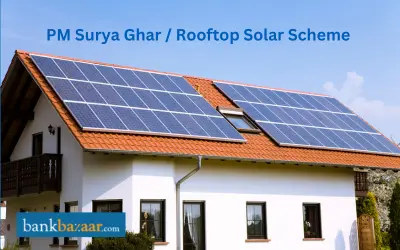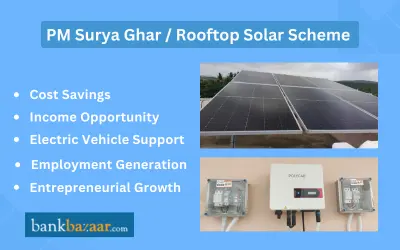PM Surya Ghar Muft Bijli Yojana - Solar Power Scheme
The PM Surya Ghar Muft Bijli Yojana, introduced by Prime Minister Narendra Modi under the Solar Rooftop Scheme 2024, aims to provide affordable solar energy to Indian households.
This initiative enables the installation of rooftop solar panels, offering free electricity and promoting clean, sustainable energy. By reducing dependency on traditional energy sources, the scheme seeks to ease financial burdens for low-income and middle-class families.
In the 2024-25 budget, Finance Minister Nirmala Sitharaman introduced the 'Rooftop Solar Scheme' or the 'PM Surya Ghar Muft Bijli Yojana.' This initiative offers subsidies for the installation of rooftop solar panels in residential properties, promoting the utilization of solar energy for electricity generation. By leveraging solar power, households can effectively reduce their electricity expenses.
The government has, however, made adjustments to the Rs.75,000-crore PM-Surya Ghar Muft Bijli Yojna. Initially, the scheme aimed to provide full subsidies for installing 1-3 KW solar systems in one crore households through partnerships with renewable energy service firms. However, the revised plan now involves covering only up to 60% of the installation costs.
PM Surya Ghar - Muft Bijli Yojana / Rooftop Solar Scheme

The Finance Minister introduced a new rooftop solar scheme in the 2024-25 Budget, subsequently launched by the Prime Minister as the ‘PM Surya Ghar Muft Bijli Yojana’. Solar panels are installed in households under this initiative to provide electricity and generate additional income through surplus electricity sales. The Central Government will offer significant subsidies directly to individuals' bank accounts and highly concessional bank loans to alleviate any financial burden.
This scheme is projected to help poor and middle-class households save between Rs. 15,000 to Rs. 18,000 crores annually by accessing free solar electricity and selling excess power to distribution companies. The government aims to install solar panels in one crore homes nationwide under this program.
PM Surya Ghar Muft Bijli Yojana objectives
The objectives of the said scheme are given below:
- PM Surya Ghar Muft Bijli Yojana offers 300 units of free electricity monthly to one crore households.
- Reduce household electricity expenses through rooftop solar panel installations.
- The scheme aims to diminish reliance on traditional energy sources.
- Its goal is to promote clean and sustainable energy practices through solar power adoption.
PM Surya Ghar Muft Bijli Yojana benefits

The benefits of this scheme are given below:
- Cost Savings: Annual savings of Rs. 15,000 to Rs. 18,000 through free electricity and income from surplus power sales.
- Income Opportunity: Sell surplus electricity to distribution companies for additional revenue.
- Electric Vehicle Support: Surplus electricity can also be used for EV charging.
- Employment Generation: Job opportunities for youth in solar panel manufacturing, installation, and maintenance.
- Entrepreneurial Growth: Opportunities for vendors in solar panel supply and installation services.
PM Surya Ghar Muft Bijli Yojana subsidy rates
The subsidy rates for PM Surya Ghar Muft Bijli Yojana are given below in the table:
Average Monthly Use of Electricity (in units) | Capacity of Rooftop Solar Plant | Subsidy Rate |
0-150 | 1-2 kW | Rs.30,000 – Rs.60,000 |
150-300 | 2-3 kW | Rs.60,000 – Rs.78,000 |
More than 300 units | Above 3 kW | Rs.78,000 |
Installation Procedure for Rooftop Solar/PM Surya Ghar Muft Bijli Yojana
Photovoltaic panels, commonly referred to as rooftop solar panels, are mounted on the roofs of residential or commercial buildings and linked to the central power supply system. This setup reduces dependence on grid-connected electricity, resulting in cost savings.
Net Metering enhances the financial viability of the entire process. It allows any excess energy generated by the solar panels to be sold back to electricity distribution companies at a fair price. Consequently, this practice significantly lowers overall electricity expenses by ensuring a balance between consumption and contribution.
Eligibility Critertia
The eligibility criteria are given below:
- Applicant household must be Indian citizens.
- Applicant household must possess a house with a roof suitable for solar panel installation.
- Applicant household must hold a valid electricity connection.
- Applicant households must not have utilized any other subsidy for solar panels.
How to apply for PM Surya Ghar Muft Bijli Yojana / Rooftop Solar Scheme
Given below are the steps to apply for PM Surya Ghar Muft Bijli Yojana:
- Visit the official website of PM Surya Ghar Muft Bijli Yojana.
- Click on the ‘Apply for Rooftop Solar’ button on the left-hand side of the homepage.
- Choose your state, district, and electricity distribution company, then enter your customer account number and proceed to the next step.
- Provide your mobile number and email and follow the instructions to complete the registration.
- Log in using your customer account number and mobile number.
- Fill out the Rooftop Solar application form.
- Await feasibility approval from DISCOM after applying. Once approved, proceed to install the solar plant through a registered vendor.
- Submit plant details and apply for a net meter post-installation.
- Following net meter installation and DISCOM inspection, obtain a commissioning certificate from the portal.
- Submit your bank account details and a cancelled cheque on the PM Surya Ghar Muft Bijli Yojana portal upon receiving the commissioning report. Subsidy will be credited to your bank account within 30 days.
How Rooftop Solar Works
- Solar Panels: Convert sunlight into electricity, reducing dependence on grid power.
- Net Metering: Surplus energy generated is sold back to the grid, reducing overall electricity costs.
Conclusion
The PM Surya Ghar Muft Bijli Yojana is a significant step toward achieving sustainable energy for all. By making solar energy accessible, the government is empowering citizens to save on energy costs and contribute to a greener future. This scheme is particularly beneficial for economically weaker sections and middle-class families, helping them reduce their financial burden while promoting renewable energy adoption.
FAQs on PM Surya Ghar Muft Bijli Yojana
1.How may one apply for the Bijli Yojana, PM Surya Ghar Muft?
Applying for the Rooftop Solar Scheme or the PM Surya Ghar Muft Bijli Yojana can be done by going to the program's official website and selecting the "Apply for Rooftop Solar" option.
2.Which kinds of roofs are appropriate for a rooftop solar system (RTS)?
Installing rooftop solar PV systems is possible on any kind of roof with enough load capacity.
3.Is it possible for an application to install a rooftop solar system if they rent a home?
Any type of framework, such as net or gross metering, allows the electrical consumer to install the RTS. Thus, the applicant may install the RTS if he or she has a connection to the electrical system in their name, pays their own electricity bills on time, and has the owner's consent to use the roof for solar rooftop installation.
4.Does India have a government scheme that provides free solar panels?
In India, there isn't a government initiative for free solar panel installation. Nonetheless, the government unveiled the PM Surya Ghar Muft Bijli Yojana, also known as the Rooftop Solar Scheme, with the goal of installing solar panels in homes and achieving solar energy generation and utilisation in households. Depending on the capacity of the solar plant, the government offers a subsidy under this scheme for the installation of solar panels that ranges from Rs. 30,000 to Rs. 78,000.
5.What would happen to the RTS if the applicant moved to a different house or place of business to where it was located?
It is simple to disassemble and reassemble the system somewhere else. It can therefore be moved to a new home.
6.What is the most recent solar grant?
Depending on the capacity of the solar plant, the recently announced PM Surya Ghar Muft Bijli Yojana offers a subsidy for the installation of solar panels ranging from Rs.30,000 to Rs.78,000.
7.Rooftop Solar Scheme: What Is It?
One crore homes are to have solar panels installed as part of the Rooftop Solar Scheme in order to provide electricity and generate extra revenue from the surplus electricity produced. This programme will enable low-income and middle-class households to sell their excess solar power to electrical distribution firms, thereby saving them somewhere between Rs. 15,000 and Rs. 18,000 crores annually.
8.Does PM-KUSUM Yojana exist?
The scheme was extended to March 2026 in August 2022. By March 2026, the scheme hopes to install 34,800 MW of solar power, with Rs 34,422 crore in central financial support.
9.For whom is the Kusum solar pump appropriate?
Every farmer, whether working alone or in teams. Every association of water users. Depending on which is less, the distribution corporation's capacity or the amount of land, the solar power plant's capacity should be 2 MW.
News about PM Surya Ghar Muft Bijli Yojana
Union Budget 2026 Allocates Rs.22,000 Crore to PM Surya Ghar
The Pradhan Mantri Surya Ghar: Muft Bijli Yojana received an allocation of Rs.22,000 crores in the Union Budget 2026. The PM Surya Ghar is one of the major schemes aimed at expanding household-level solar adoption and reducing electricity consumption nationwide. Compared to the allocation of Rs.20,000 crores in the Union Budget 2025, there is a 10% increase in the 2026 Budget for the scheme. The higher allocation emphasizes the importance of promoting renewable energy, which is integral to the nation's environmental commitment.
Union Budget 2024: PM Surya Ghar Muft Bijli Yojana
The Government of India had launched the PM Surya Ghar Muft Bijlee Yojana to facilitate installation of rooftop solar panels. This would enable 1 crore households to get free electricity of up to 300 units per month. More than 1.28 crore registrations and 14 lakh applications have been received so far.

Disclaimer
Credit Card:
Credit Score:
Personal Loan:
Home Loan:
Fixed Deposit:
Copyright © 2026 BankBazaar.com.
